12+ SAMPLE Job Contract Proposal
-
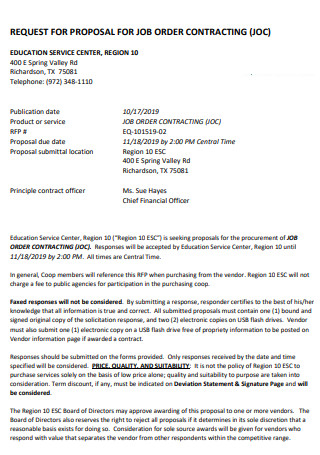
Job Contract Proposal
download now -

Job Contract Project Proposal
download now -
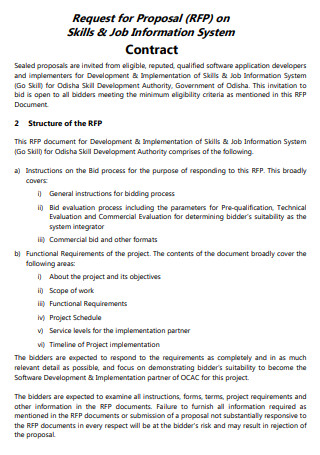
Job Information System Contract Proposal
download now -
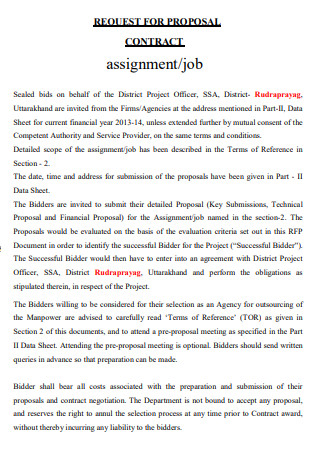
Job Assignment Contract Proposal
download now -
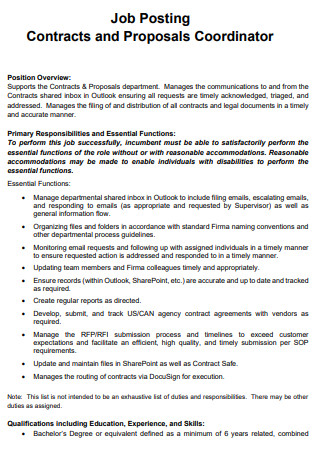
Job Posting Coordinator Contract Proposal
download now -
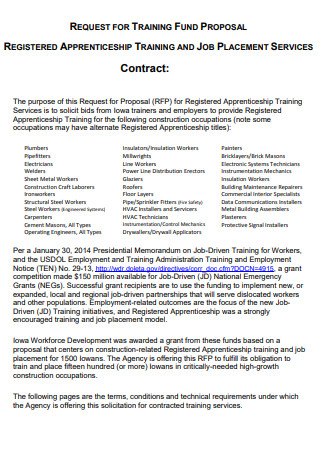
Job Training Contract Proposal
download now -
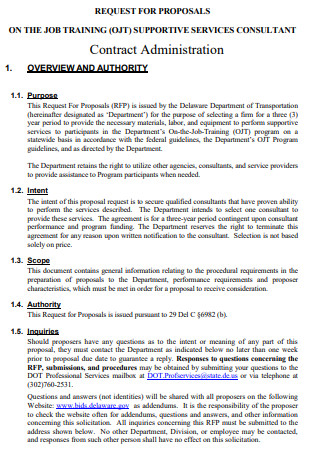
Job Training Contract Services Proposal
download now -
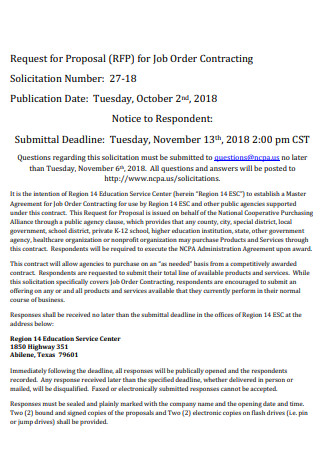
Job Contract Request for Proposal
download now -

Job Consulting Contract Proposal
download now -
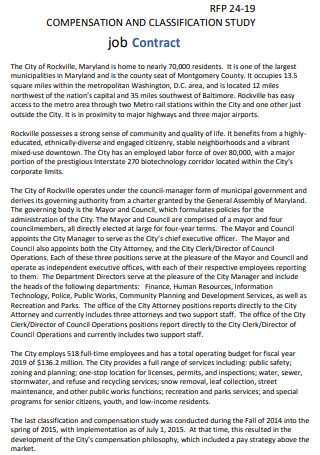
Job Compensation Contract Proposal
download now -
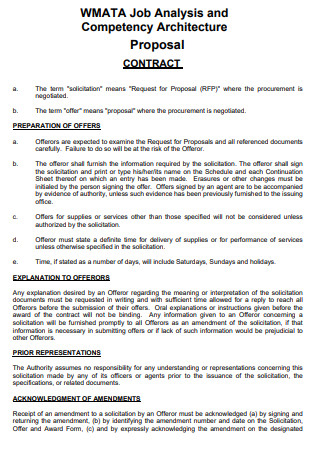
Job Analysis Contract Proposal
download now -
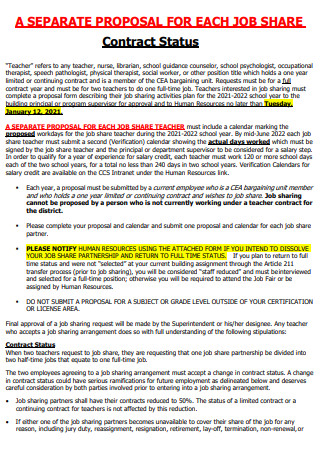
Job Contract Status Proposal
download now -
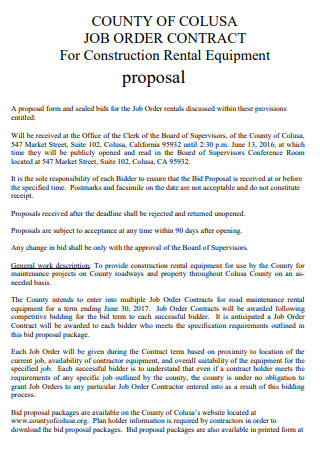
Job Order Contract Proposal
download now
FREE Job Contract Proposal s to Download
12+ SAMPLE Job Contract Proposal
What Is a Job Contract Proposal?
What Is the Importance of a Job Contract Proposal?
What Are the Types of Terminations a Contract Should Allow?
Key Components of a Job Contract Proposal
Steps in Writing a Job Contract Proposal
FAQs
Is it possible to sue your employer for breach of contract?
Has there anything that happens when an employee is finished signing a job contract and then declines to do so?
Can employers change the terms and conditions in a contract?
What Is a Job Contract Proposal?
A contract of employment is a written agreement between an employer and an employee that outlines the terms and conditions of employment between the two parties. It is a written agreement between an employer and an employee that specifies the terms and conditions of employment. The agreement can be formed either orally or in writing, and it can include both explicit and implicit provisions. Contracts of employment are not formed in all situations involving the employment of a person. However, when the task is not informal, it is usually advantageous to have one. Job contracts can be completed orally as well. Nonetheless, if the parties are serious about the contract, they should put it in writing. If a dispute arises between an employer and an employee, the contract may be able to assist in resolving the situation. Employers can negotiate contractual terms and conditions to safeguard and define the duties of the two parties involved in the employment relationship, as well as discuss benefits and remuneration, through the use of an employment contract. Templates for job contract proposals can be found in the section above.
We also have other themes that you can utilize at any time on our website if you require them. The following templates are available: payroll verification report, catering contract proposal, security bid proposal, restaurant service plan, consulting contract proposal, club strategic plan, bid contract proposal, quality control agreement, customer invoice, service contract proposal, and other similar templates. As well as templates, this post contains critical information that you should be aware of in order to successfully complete your template.
What Is the Importance of a Job Contract Proposal?
Contracts can be used in a variety of ways, and as a result, there are numerous reasons why they are necessary. In the beginning, contracts serve as the primary source of trust for both the employer and the employee. This results in the formation of relationships within a company.
1. Employment Terms and Circumstances Are Governed by this Act.
The primary goal of the job contract agreement is to do this. Terms and conditions are extremely important for both the employer and the employee since they lay out the framework for their roles and responsibilities within an organization. The time restriction for an employee’s contract to remain with the company is included in one contract, for example, for two or five years, depending on the situation. You should also see our event bid contract.
2. Maintaining the Confidentiality of Sensitive Information
In order to perform his or her work duties, the employer must provide the employee with access to proprietary company information and data, and even the secret trade formulation. This is not a new requirement. The most straightforward approach to protecting them is to require employees to sign confidentiality agreements. This rule bans employees from disclosing confidential or sensitive information to third parties. It can be made available to the media or the general public, or it can be put on social media or used for any other reason you choose. If an employee violates the terms of his or her employment contract, the employer may take legal action against him or her.
3. Specify the Terms of Service that Are Required
In addition, the contract of employment should specify the specific actions that can result in termination. This information ensures that every employee is aware of the actions or behaviors that are required for his or her position, as well as the consequences of disobeying business policies, which might result in dismissal.
4. Assistance in Lowering the Number of Disagreements that Emerge Between an Employer and an Employee.
It is possible that another significant feature of employment contracts is the dispute settlement process. Another objective of the employment contract is to serve as a means of resolving disagreements. A well-written contract for a task reduces conflicts between two parties, which limits the amount of time and money spent in a legal battle that neither party can afford. Contract bonds protect both the employee and the employer within set boundaries, reducing the likelihood of a conflict.
5. Employees Take Time Off
With a contract, you may assure that procedures like vacation, sick leave, and other benefits are legally protected. Employees may require time off for vacation, maternity leave, or bereavement leave. When it comes to this matter, employees can always look to their employment contract for guidance. In addition, any compensated employees who take days off work for any reason will be specifically defined in the contract. In the contract, the employee’s ability to make a reference to leaving was limited. This establishes the conditions for companies to retaliate against employees who request longer leaves of absence beyond the terms of their employment contracts. Employers often have preconceived assumptions regarding leave, such that an employee’s absence has little influence on their day-to-day operations.
What Are the Types of Terminations a Contract Should Allow?
When one or both of the parties’ contractual obligations are fulfilled, the contract is said to have been successfully terminated. Both parties must agree that the agreement is no longer required in order for the agreement to be terminated as quickly as possible.
1. Employee’s Resignation from the Company
The resignation of an employee is a unilateral act signifying the employee’s choice to cease the relationship with his or her employer. The resignation does not require the approval of the employer and cannot be revoked once it has been communicated unless the employer agrees to the withdrawal.
2. The Employee’s Death
The job automatically terminates upon the death of the employee. Employees with disabilities are entitled to immediate termination of their employment with the Company, which can be accomplished by the Company obtaining written notice of such termination from the Employee. Personal contracts, on the other hand, are frequently terminated promptly upon the death of an employer. Despite the fact that the contract has expired, the employee is not permitted to file a claim for wrongful dismissal compensation or statutory redundancy pay on his or her own self. You should also see our travel contract proposal.
3. Employee Misconduct
The termination of a contract as a result of misbehavior is a significant and meticulously designed disciplinary step. Employers are required to conduct a formal investigation before taking any disciplinary action. Misconduct is defined as failing to comply with the terms of employment specified in the service contract.
4. The Successful Completion of a Project
Your responsibilities as a contractor end once the project is completed, including the correction of any faults, and when the defects liability period has expired, if one exists. obligations that you have under a construction contract The contract comes to an end in the event that one of the parties chooses to terminate the agreement.
Key Components of a Job Contract Proposal
The following are the critical components that no employer or Job Contractor should overlook. You can find examples of these elements in the job contracting section above.
Steps in Writing a Job Contract Proposal
When producing a letter that offers a job in conjunction with a contract, it is critical to have them professionally examined in order to ensure that the terms and conditions are clearly defined. This will also limit the likelihood that forbidden phrases will be mistakenly included in the document.
-
1. Select a Template for Your Project.
Please make sure to select a job contract from the various Templates listed above. Make sure to select the template that corresponds to the job title contained inside the contract.
-
2. Create a Job Contract that Is Unique to You.
If you are unable to find any suitable contracts, you can create your own by first looking at the forms of the employment contract samples provided above and then modifying them.
-
3. Select the Formatting Style that You Believe Is the Most Appropriate.
After looking through the samples and noting how they are formatted, decide which ones will serve as your guide. Make certain that your formatting is comprehensible and follows a logical order.
-
4. Begin the Encoding Process.
All of the necessary information, as well as all of the key parts listed above, should be encoded. Include everything, and the only thing that should be missing is the signature, which is done once you have read the full job contract in its entirety.
-
5. Consult with an Attorney.
You can seek legal assistance from a lawyer in order to determine whether or not the contract you entered into is valid and capable of protecting both parties in the event of a disagreement. If the attorney requests adjustments, you should comply with his request.
-
6. Put Your Signature on the Contract.
The contract should be signed by both the employer and the employee. Some companies would like their employees to sign each and every page of the contract in order to ensure that they have read and comprehended each and every page of the contract in its entirety. You should also see our job contract.
FAQs
Is it possible to sue your employer for breach of contract?
When an employer or employee breaches or fails to meet the obligations of the employment contract, they may be said to have violated the employment contract in question. The term “breach of contract” refers to any type of serious misconduct on the part of an employee, ranging from minor infractions such as the failure of the employer to pay costs on time to more serious infractions such as the violation of a contract’s essential terms and conditions.
Has there anything that happens when an employee is finished signing a job contract and then declines to do so?
An employee cannot just walk away from a contract that has been signed. The employee must follow legal procedures, such as sending the employer formal notice that they are canceling the contract, which should result in the termination of the employment relationship. This is something that needs to be discussed by both parties, and the outcome should be reached by mutual agreement. If this is the case, the law may be able to assist you.
Can employers change the terms and conditions in a contract?
Employees may not be asked to agree to changes in the terms of their employment contracts unless they are requested to do so by the employer. If the workers are hired on a collective bargaining basis, negotiations with the union must take place before any changes can be implemented.
Employment contracts should be thoroughly reviewed before signing because they may have ramifications if the terms of the agreement are not followed through. Employee/employer relations are generally improved when there is a written agreement between the two parties about their employment. Both parties are aware of what the other party expects from the relationship. They have a right to employees as well as any money they may hope to make in the future. If a firm is found to have failed to issue a complete contract in the case of an employment tribunal, the penalty might be as much as one month’s salary or more.
